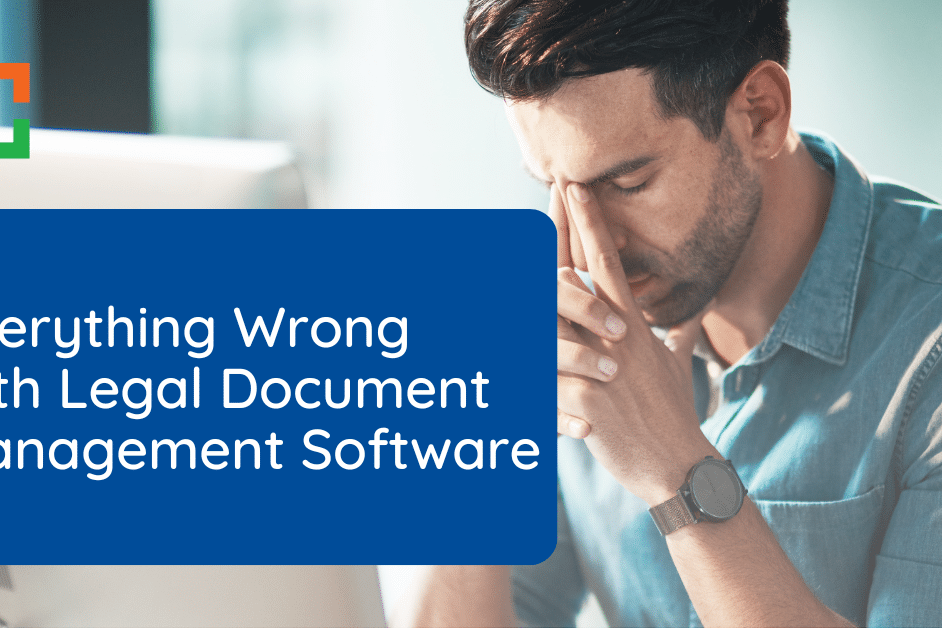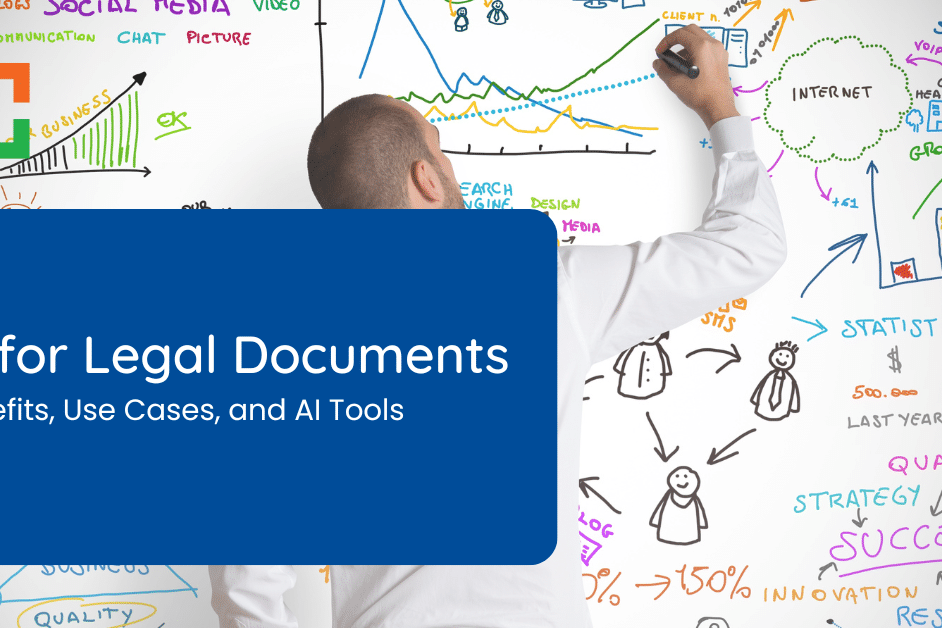Benefits of Using a Legal Document Management System
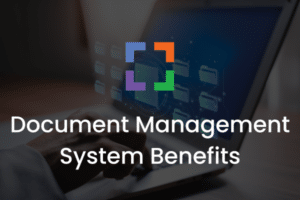
With numerous options out there, paying attention to the varied benefits allows you to have some objectivity as you evaluate software.
In this article, we aim to provide insight into what Document Management Software entails, what benefits are offered, and how you can use this information to make better decisions for your law firm.
Let’s dive in!
As you read about Document Management System Benefits, consider what the software aligns with your values. For a deeper dive, take a look at our article on the Best Legal DMS.
In This Article
- Introduction to Document Management Systems
- When Law Firms Should Use Document Management Systems
- Why You Should Implement a Cloud-Based Document Management System
- The Document Management System Benefits
- Comparing Document Management System Benefits
- How to Utilize Document Management System Benefits
- Frequently Asked Questions about Document Management System Benefits
Introduction to Document Management Systems
The legal industry faces unique challenges in managing the ever-growing volume of documents.
This is where the Document Management System (DMS) comes into play, offering a multitude of benefits tailored to the specific needs of law firms. For law firms, a DMS is not just a tool but a strategic asset.
Document Management Systems (DMS) are specialized software solutions designed to handle the complex documentation needs of various sectors, particularly law firms.
In a legal setting, these systems offer a robust framework for storing, organizing, retrieving, and managing a vast array of documents, including case files, legal briefs, contracts, and client information.
They facilitate easy access to documents, enabling legal professionals to efficiently search using keywords, categorize by client or case, and manage versions of documents. Advanced features like unique document IDs, integration with Microsoft Office, and compliance tools further streamline workflow and enhance security.
DMS systems also offer features for collaboration, remote access, and document tracking, making them essential for the digitized, fast-paced environment of modern law practices
With this understanding of Document Management Systems, let’s talk about when they’re most useful.
Related – Best Legal Document Management Software: Evaluate various document management software to ensure your firm’s utilizing the best option.
When Law Firms Should Use Document Management Systems
Law firms often reach a tipping point where traditional methods of managing documents become inadequate.
This moment is pivotal and demands a strategic shift towards a more robust, secure, and efficient system. The decision to implement a DMS should be guided by several critical factors, each signaling the growing needs of a dynamic legal practice.
Let’s delve into these indicators that suggest when a law firm should transition to using a Document Management System.
Increasing Volume of Documents
As a law firm expands, the influx of documents like case files, contracts, and client communications can become unmanageable.
This can lead to disorganization and inefficiency, making the need for a DMS more critical.
An effective DMS can handle high volumes of documents, categorize them efficiently, and ensure they are easily retrievable, thus catering to the evolving needs of a growing firm.
Need for Enhanced Security
The sensitive nature of legal documents demands high-level security.
A DMS not only secures documents against unauthorized access but also provides comprehensive audit trails, ensuring that every access or change to a document is tracked.
This feature is indispensable in maintaining client trust and upholding legal confidentiality.
Compliance Requirements
Staying compliant with legal regulations such as HIPAA or GDPR is non-negotiable for law firms.
A DMS can automate aspects of compliance, such as retention schedules and secure document disposal, thus reducing the risk of non-compliance penalties and ensuring that the firm meets all legal obligations.
Seeking Efficiency and Productivity
Inefficient document management can lead to delays and errors.
A DMS streamlines document handling from creation to archiving, accelerating retrieval times, reducing errors, and thereby improving overall firm productivity and client service.
Collaboration and Remote Access Needs
Modern legal work often involves collaboration across different locations.
A DMS facilitates this by providing a centralized repository accessible from anywhere, ensuring that all team members have up-to-date information, which is especially crucial in a remote working environment.
Cost Reduction Goals
The costs associated with physical document storage and management can be substantial.
A DMS reduces these costs by digitizing documents and automating management processes, leading to savings on storage space, printing, and labor, making it a financially savvy choice for law firms.
Integrating with Other Legal Technologies
For firms looking to integrate their document management with other legal tech solutions, such as case management systems or e-discovery tools, a DMS can offer seamless integration, enhancing overall operational synergy.
Transition to a Paperless Environment
Law firms aiming to reduce their environmental footprint and embrace digital transformation will find a DMS instrumental in transitioning to a paperless office, reducing reliance on physical documents while enhancing accessibility and efficiency.
Related – Virtual Law Firm: Thinking about going virtual? Good choice! Learn how to do it optimally.
The decision to implement a Document Management System in a law firm is not just about addressing current challenges, but also about future-proofing the practice.
It is a strategic investment that pays dividends in efficiency, security, and client satisfaction. When you find that your firm is prioritizing one or more of these reasons, hopefully you’ll evaluate the best DMS for your needs.
Why You Should Implement a Cloud-Based Document Management System
Acknowledging the benefits of server-based software is crucial, as some server-based systems indeed provide broader functionalities than certain cloud-based alternatives.
In specific scenarios, opting for a server-based system could be advantageous, for example:
- If your firm has existing servers and is adept at their maintenance.
- When prioritizing high-functionality software over cloud mobility.
- If there’s a substantial, existing network infrastructure that’s preferred to remain unchanged.
- When certain advanced features exclusive to server-based software are essential for your firm.
Legacy Document Management
Traditional Document Management Systems often come with challenges, such as intricate navigation, costly installations, and demanding upkeep.
Despite the long-standing reliance on these Legacy Document Management systems, there’s a growing shift towards a more streamlined and efficient approach — Cloud-Based Document Management.
To grasp the nuances between these systems and understand why a shift towards cloud-based solutions is gaining momentum, I encourage you to view the accompanying video. It offers insights into why many, myself included, are favoring this modern approach to document management.
On the contrary, Cloud-Based Software offers significant advantages:
LexWorkplace Top Features
as a Cloud-based DMS
- Seamless Collaboration
- No Server Responsibility
- Better Data Security
- Lessened Need for Paid IT Support
- User Access/Permissions
- Work-Life Balance
- Ability to Pursue a Virtual Law Firm and a Paperless Law Firm
Server Failure
A cautionary note is essential regarding server-based software. In-house server management can be intricate, costly, and frequently frustrating.
A detailed server lifecycle analysis is provided in the accompanying chart.

Regular data backups and scheduled server replacements are critical to minimize data loss risks.
Other Reasons to Choose Cloud-Based Software
Work Anywhere
Cloud-based legal document management enables remote work with office-level document access, crucial in today’s hybrid working models.
This supports virtual law firms, offering cost savings and enhanced satisfaction.
Lower IT Costs
Server-based systems require extensive IT management, often involving costly external consultants.
Cloud-based systems negate the need for server management and software installations, cutting down both initial and ongoing IT costs.
As your firm expands, cloud-based solutions provide scalable, cost-effective alternatives sans increasing server maintenance burdens.
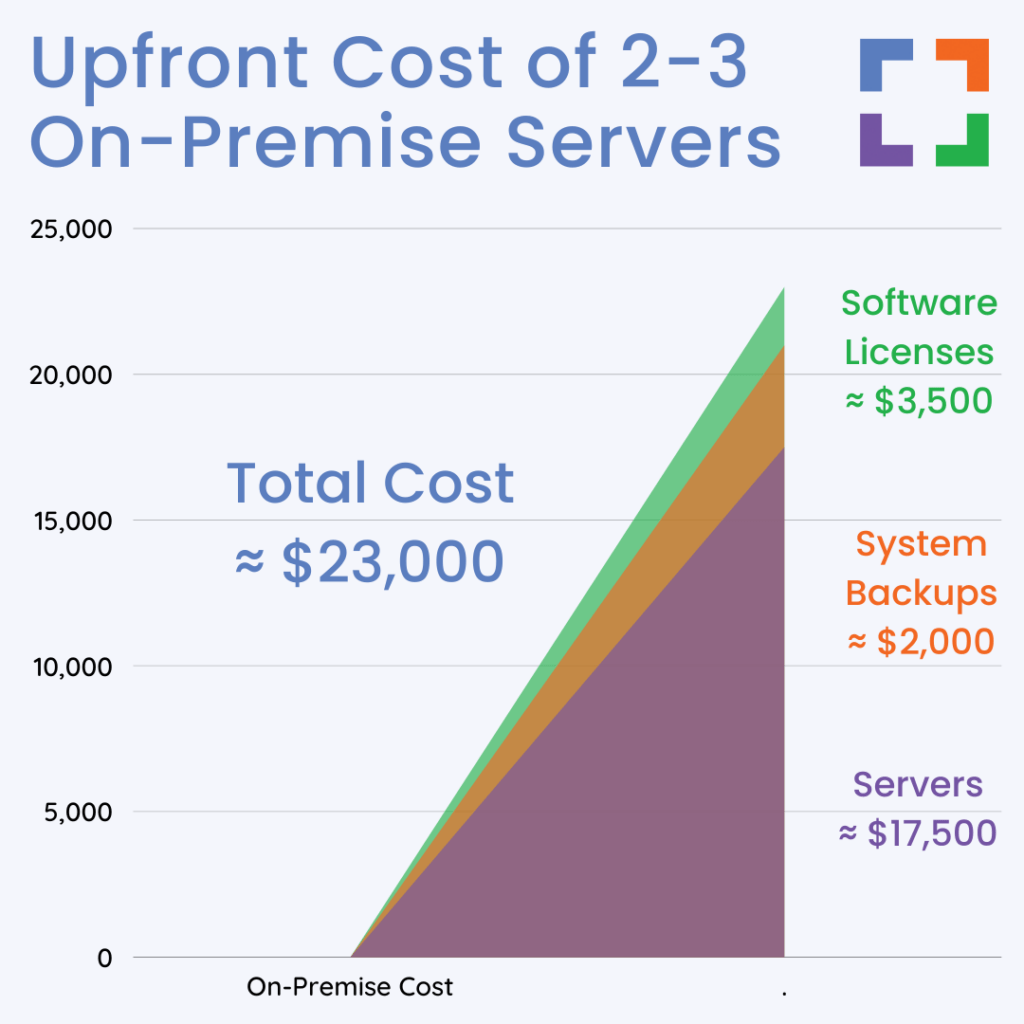
Data Security
Selecting an appropriate Document Management system significantly bolsters your firm’s and clients’ data security, surpassing in-house file servers. Premium systems typically include:
- Full Data Encryption In-Transit and At-Rest
- Multi-Factor Authentication (MFA)
- Geographically Redundant Backups/Data Centers
- User/Group Permission Management
Cloud-based tools generally offer superior security and compliance, often as standard features, compared to even the most sophisticated in-house servers.
Automatic Software Updates
Cloud-based legal document management systems ensure automatic updates, seamlessly introducing new functionalities and resolving bugs without manual intervention.
Email Management
For many firms, the convenience of email management via a DMS is key.
A suitable DMS facilitates efficient saving and categorizing of emails directly from Outlook, centralizing documents and emails in one searchable location, accessible firm-wide.
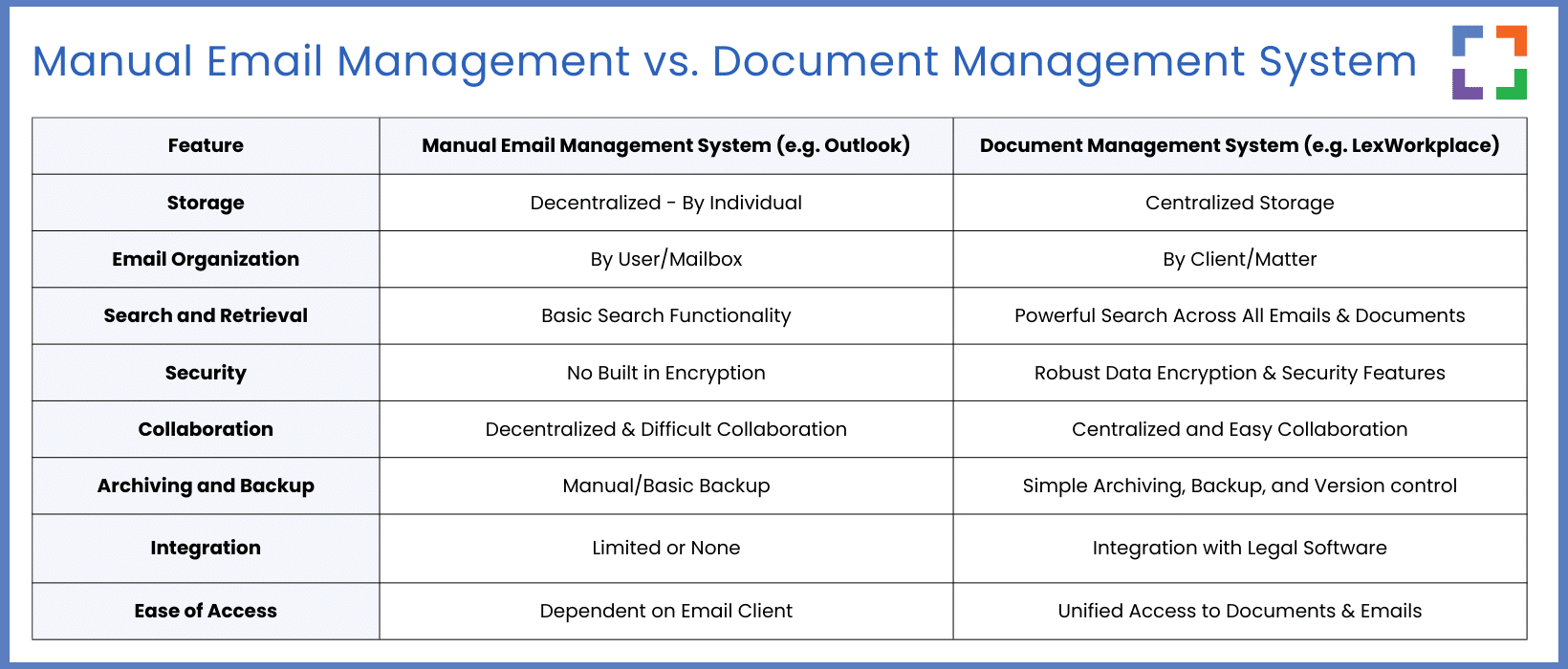
Scalability
Cloud-based DMS solutions are highly adaptable, easily accommodating storage and user changes, supporting both growth and downsizing without hefty infrastructure costs.
Related – 12 Ways LexWorkplace Will Help Your Firm Do More with Less
See 12 ways LexWorkplace will streamline your law office.
The Document Management System Benefits
Understanding the tangible advantages of a DMS will further clarify why integrating such a system is a critical step for any forward-thinking law firm.
Let’s explore the specific document management system benefits.
Centralized Document Access
A DMS consolidates all documents in one central repository, making it easier for staff to find, access, and manage legal documents from a single platform.
This centralization is crucial in large firms where documents are often scattered across various locations.
Enhanced Document Security
Beyond basic security measures, a DMS offers advanced features such as role-based access controls and automatic logging of document access and modifications.
These features are particularly important in handling sensitive legal cases where document confidentiality is paramount.
Automated Workflow Management
DMS can automate many routine tasks such as document filing, tracking, and archiving.
This automation streamlines workflow, reduces manual errors, and improves overall efficiency in document processing.
Integration with Legal Software
Many DMS solutions offer seamless integration with other legal software systems, providing a unified platform for case management, billing, and document handling.
This integration is key to creating a cohesive technology ecosystem within the firm.
Scalability for Growing Practices
As a law firm grows, its DMS can scale to meet increasing demands without a drop in performance or efficiency.
This scalability is essential for expanding practices that need to manage growing volumes of documents without additional resource investments.
Data Analytics and Reporting
Advanced DMS platforms provide analytics and reporting capabilities, offering insights into document usage, workflow efficiency, and compliance.
These insights can be invaluable for strategic planning and operational improvements.
Disaster Recovery and Business Continuity
With digital storage, a DMS ensures that documents are safe from physical disasters like fires or floods.
Cloud-based DMS solutions, in particular, offer robust backup and recovery options, ensuring business continuity even in the face of unforeseen events.
Reduced Physical Storage Needs
By digitizing documents, law firms can drastically reduce the need for physical storage spaces like file cabinets, which in turn frees up office space and reduces storage costs.
By focusing on these distinct aspects, law firms can better understand the specific ways a DMS can enhance their operations.
In the next section, we’ll explore practical strategies for leveraging these benefits to maximize the effectiveness of a DMS in a legal setting.
Bring Law and Order to Your Documents
LexWorkplace Includes:
- Document Profiling / Metadata
- Structured by Client/Matter
- Organize With Folders and Tags
- Save Emails to Matters
- Built-In Version Management
- Add Notes to Docs & Email
Comparing Document Management System Benefits
When evaluating and comparing Document Management Systems (DMS) for a law firm, it’s crucial to consider several detailed aspects to ensure the chosen system aligns with the firm’s needs.
Different systems will offer different benefits, or they will provided in different ways.
Choosing the best system for your firm requires a comparison of each system’s benefits in the way they show up. Let’s look at some of the features/benefits you can use to determine the best fit.
Data Management and Organization
Some DMS offer more advanced categorization, allowing for complex hierarchical structures, while others might focus on simple tagging systems.
The ability to customize these structures according to legal case requirements is a critical differentiator.
Advanced Search Functionality
Assess whether the DMS can handle natural language queries or requires specific keyword-based searches.
The precision and speed of these search functions can significantly impact workflow efficiency.
Collaboration Tools
Look for features such as real-time editing, version tracking, and comment integration.
The depth of these collaboration features can vary, influencing how effectively team members can work together on documents.
Customization for Legal Specifics
Some systems may offer pre-built templates for legal documents or integration with legal research tools, providing a more tailored experience for legal workflows.
Client Interaction Features
Consider the ease and security with which documents can be shared with clients.
Features like client portals for document access and e-signature capabilities can enhance client service.
Mobile Accessibility and Remote Work Support
Evaluate the functionality and user experience of the DMS on mobile devices.
The ability to access and edit documents seamlessly on tablets or smartphones can be a significant advantage for lawyers working remotely.
System Updates and Maintenance
Understand the frequency and impact of system updates.
Regular updates can provide new features and security improvements but might require occasional adjustments in workflow.
Technical and Customer Support
Assess the responsiveness and expertise of the DMS provider's support team.
Quick and knowledgeable support can be crucial in resolving technical issues efficiently.
By scrutinizing these finer aspects, law firms can select a DMS that not only manages documents efficiently but also enhances the overall dynamics of legal practice, from internal operations to client interactions.
This careful evaluation will pave the way for a more informed decision, leading to a DMS that truly complements the firm’s strategic vision.
Comparing Document Management Systems
To further facilitate this comparison, we have created a comprehensive Document Management Software Comparison Chart.
Here’s a taste.
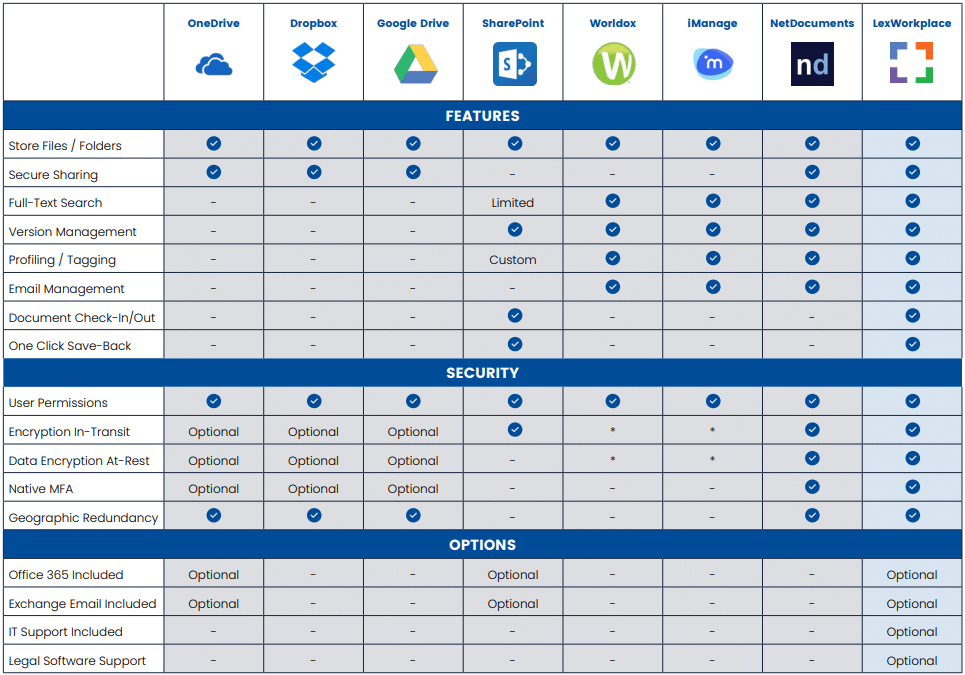
Your job is to use the provided chart to match your top-priority feature requirements with the features detailed in the chart. By doing this, you can determine which software is the most suitable for your firm’s specific needs.
Looking for a more comprehensive analysis? We invite you to download our full Document Management Software Comparison Chart, available for download below.
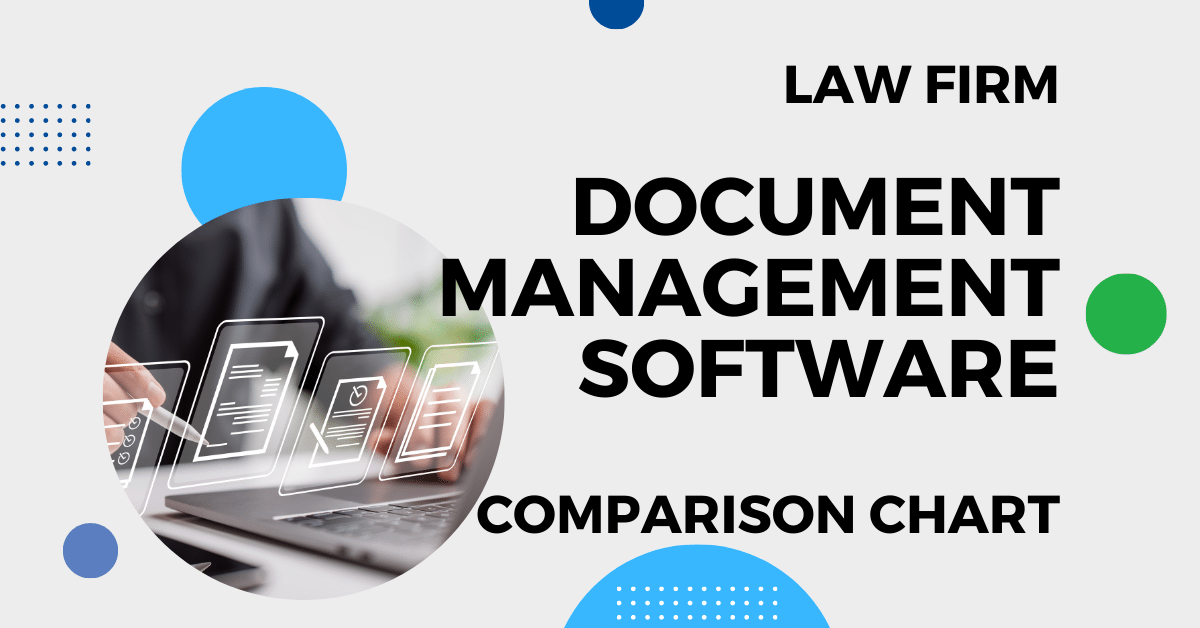
Compare the leading Document Management software used by law firms.
How to Utilize Document Management System Benefits
To fully harness the myriad Document Management System Benefits, law firms need a well-thought-out approach that goes beyond mere installation.
It’s about embedding the DMS into the very fabric of the firm’s operations, ensuring that every feature is leveraged to optimize processes, secure data, and enhance productivity.
This utilization involves a series of strategic actions, from tailoring the system to meet specific firm needs to ensuring its seamless integration with existing workflows.
Let’s delve into this step-by-step approach for making the most of a DMS, ensuring that its adoption translates into tangible improvements in efficiency, security, and client service.
1
Customize for Your Firm's Needs
Tailor the DMS to align with the specific requirements of your law firm.
This involves setting up detailed document categorization, defining access levels based on roles, and customizing workflow processes.
2
Comprehensive Staff Training
Conduct thorough training sessions for all staff members, focusing on key functionalities such as document search, upload, categorization, and using collaboration features.
This ensures everyone is comfortable and proficient in using the DMS.
3
Seamless Integration with Existing Systems
Connect the DMS with existing legal software like case management and billing systems.
This integration centralizes data, streamlines processes, and enhances overall operational efficiency.
4
Regular System Review and Feedback
Implement a regular review process to assess how the DMS is being used.
Solicit feedback from users and use this information to make ongoing adjustments, improving system performance and user experience.
5
Maximize Use of Analytics
Leverage the DMS’s analytics and reporting tools to gain insights into document handling, workflow efficiency, and identify potential areas for improvement.
6
Maintain Security and Compliance
Keep the DMS updated with the latest security protocols and compliance standards.
Regularly monitor access controls and audit trails to safeguard document confidentiality and integrity.
7
Enhance Client Services
Utilize the client portal features of the DMS to facilitate better communication and document sharing with clients.
This can improve transparency, efficiency, and overall client satisfaction.
This strategic approach to utilizing a DMS can transform how a firm manages its information and interacts with clients, ultimately leading to enhanced service delivery and a strong competitive edge in the legal marketplace.
LexWorkplace Success Story
See how one law firm uses LexWorkplace to organize their documents and streamline their practice.
Book a 15-Minute Demo
Frequently Asked Questions about Document Management System Benefits
A Legal Document Management System (LDMS) is a specialized software solution designed to help law firms and legal departments manage, store, and organize legal documents. It streamlines the process of handling legal documents, making it easier to access, edit, and share them securely.
DMS benefits law firms by improving efficiency, reducing the risk of losing important documents, enhancing document security, facilitating compliance with legal standards, and enabling quick and easy access to legal documents. This leads to better organization, time savings, and improved client service.
Cloud-based DMS offers greater flexibility, scalability, and cost-effectiveness compared to server-based systems. They typically require less maintenance, provide better remote access capabilities, and include automatic updates and advanced security features.
A DMS enhances data security through encryption, access controls, and audit trails. These features ensure that sensitive information is protected against unauthorized access and data breaches.
Yes, most modern DMS solutions are designed to integrate seamlessly with various legal software, including case management and billing systems, streamlining workflows and improving efficiency.
While training is necessary, many contemporary DMS platforms are user-friendly with intuitive interfaces, minimizing the learning curve and facilitating easier adoption across the firm.
Yes, DMS can be cost-effective for small firms by reducing physical storage needs, automating routine tasks, and improving overall operational efficiency. Cloud-based solutions, in particular, offer scalable pricing models suitable for smaller practices.
Yes, a DMS can help maintain compliance with legal standards by securing sensitive data, managing document retention policies, and ensuring easy access to documents for audits and reviews.
Absolutely. A Legal Document Management System enhances collaboration by allowing multiple team members to access and work on documents simultaneously. It also tracks changes and revisions, ensuring that everyone is working on the most current version of a document, which is crucial in legal settings.
When choosing an DMS, consider factors such as the system’s security features, ease of use, compatibility with existing software, scalability, customer support, and specific features that cater to your firm’s unique needs. It’s also important to consider the vendor’s reputation and the feedback from other legal professionals who have used the system.
Looking for Document Management Software?
LexWorkplace:
Modern Document Management for Law Firms
LexWorkplace is document & email management software, born in the cloud and built for law firms. Here’s a quick primer on how it works.
Organize by Client & Matter
Organize documents, email and notes by client or matter. Store and manage all data for a case or project in one place.
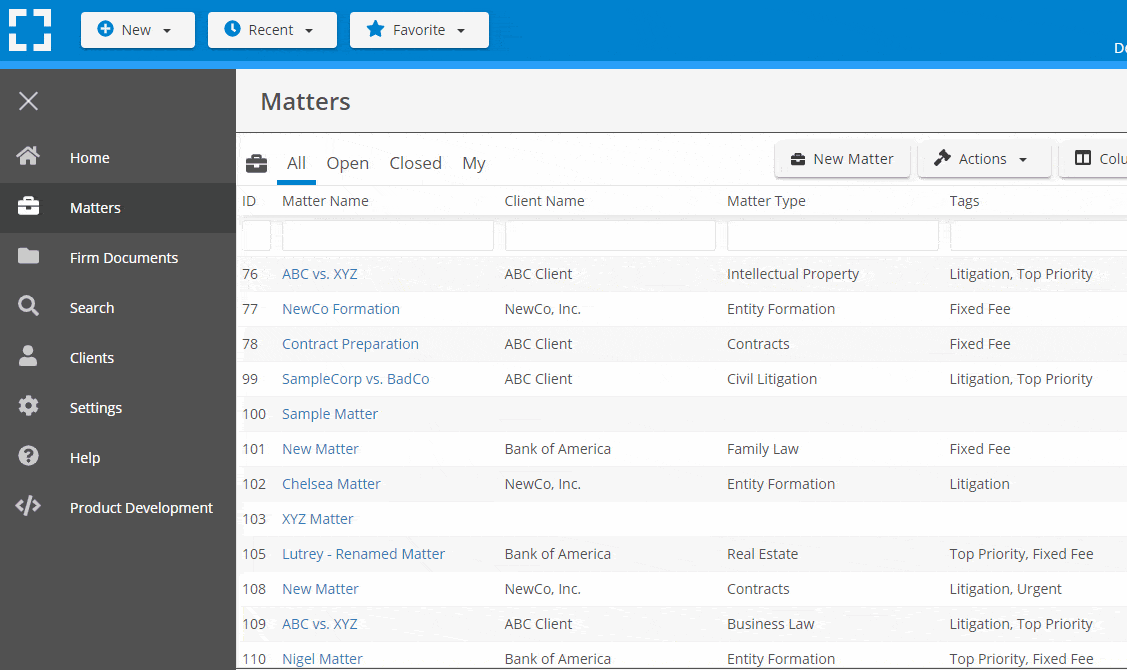
Go Beyond Basic Files & Folders
Supercharge your firm’s productivity with true DMS functions.
- Version Management
- Document Tagging & Profiling
- Document Check-Out / Check-In
- Microsoft Office Integration
- Automatic, Integrated OCR
- Convert Word Docs to PDF
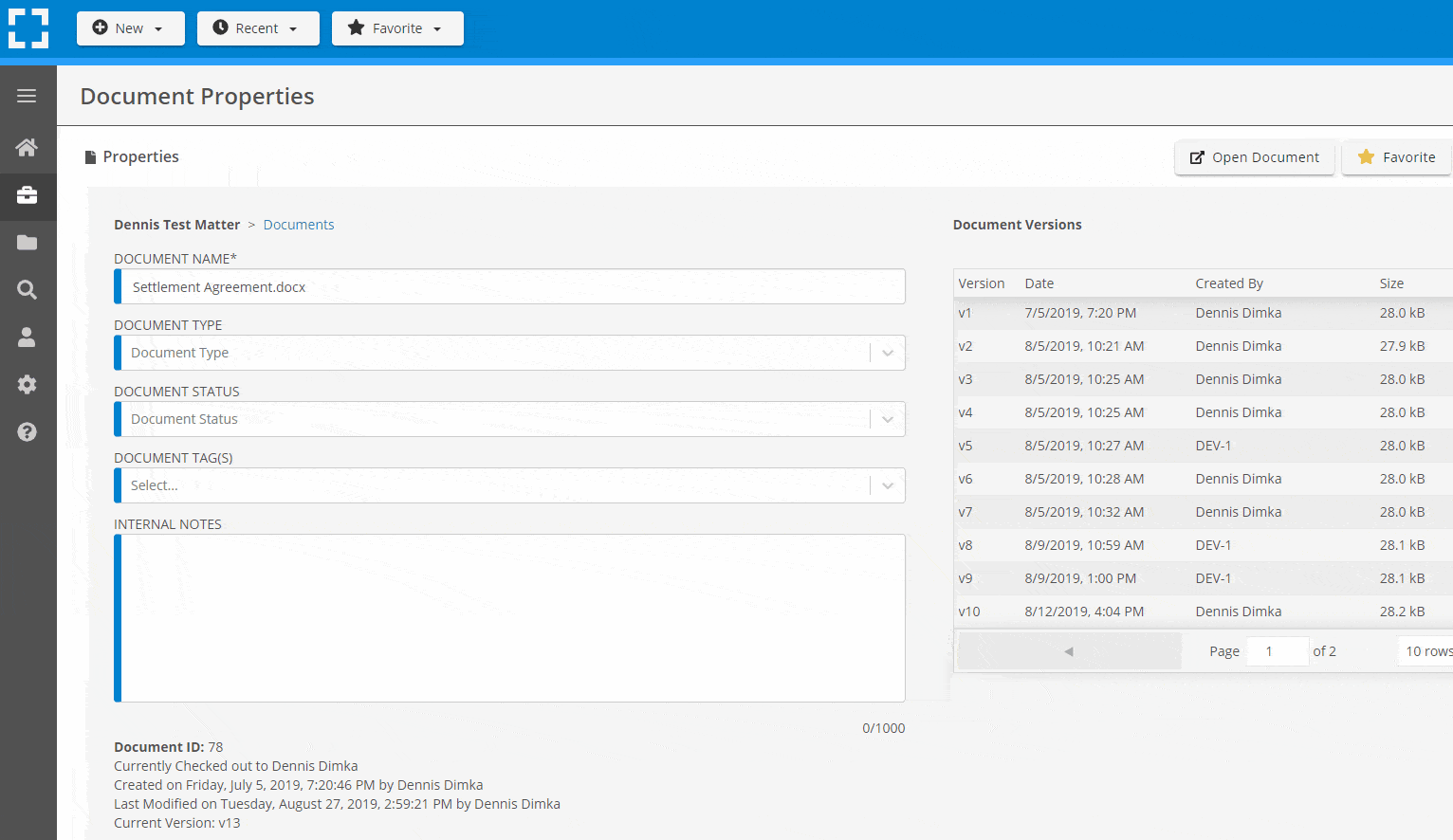
Search Everything
LexWorkplace is like Google for your law firm. Search across millions of pages, documents, folder email and notes in seconds. Refine your search by matter, document type, author and more.
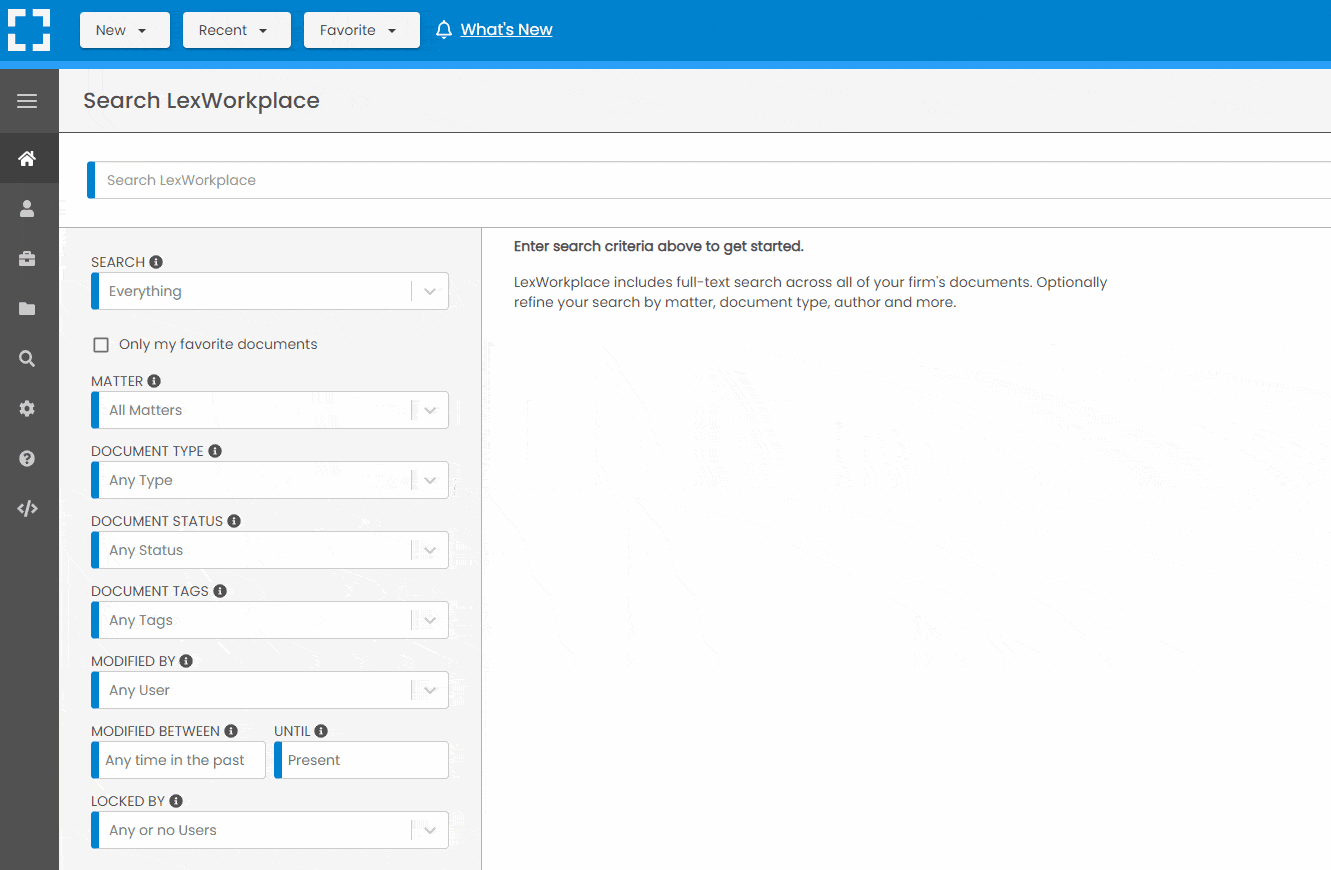
Search by…
- Client or Matter
- Document Type (Contract, Complaint, Order, etc.)
- Document Status (Draft, Final, etc.)
- Document Tags (Filed With Court, Fully Executed, etc.)
Outlook Integration + Comprehensive Email Management
Save emails to a matter without leaving Outlook. Saved emails are accessible to your entire team, organized and searchable.
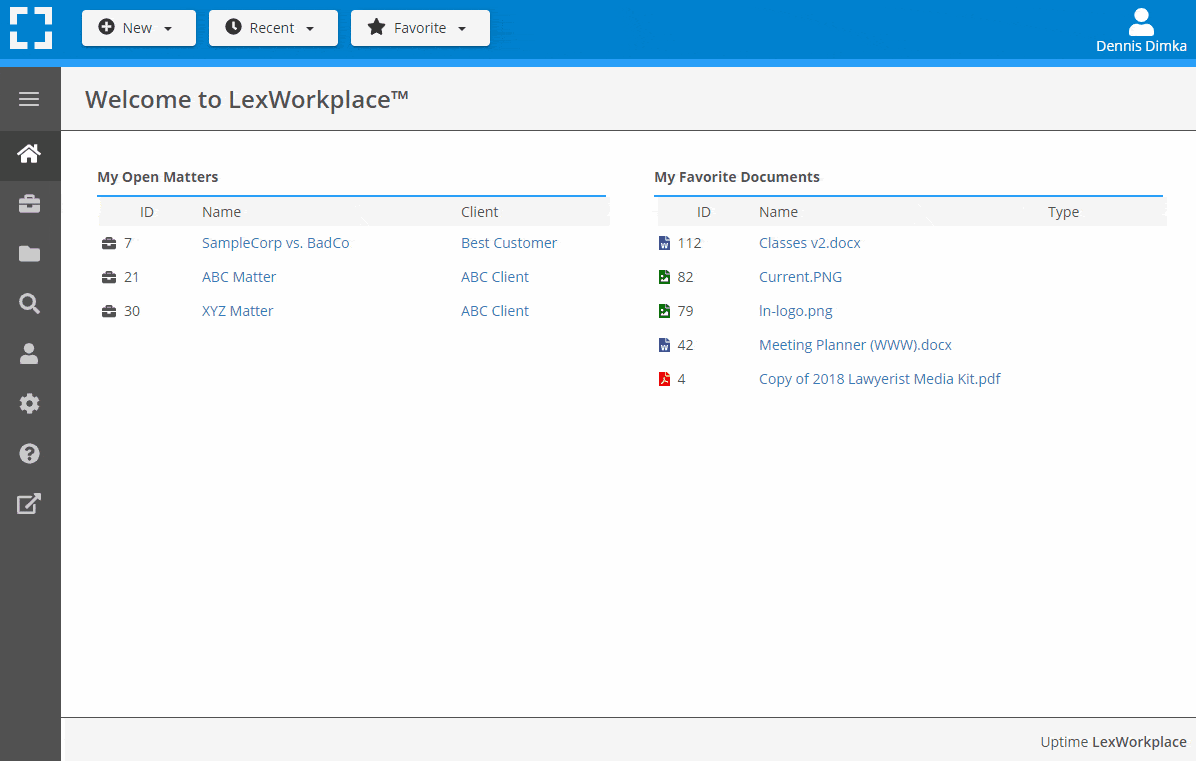
- Outlook Add-In that Works With Windows and Macs
- Save Entire, Original Email to a Matter in a LexWorkplace
- Email De-Duplication
- Organize Emails into Folders, Subfolders
Works with Windows and Macs
All of LexWorkplace is compatible with both Windows and Mac computers.
What Clients Say
Lawyers love LexWorkplace. See how the system streamlined one lawyer’s practice.
Watch the 5-Minute Demo
See LexWorkplace in action in our quick 5-minute overview and demonstration.
Or, if you want a one-on-one demo, or want to talk about LexWorkplace for your firm, schedule a call or demo below.
You Might Also Like
May 14, 2024
Everything Wrong with Legal Document Management Software
Legal document management software…
April 12, 2024
AI for Legal Documents: Benefits, Use Cases, and AI Tools
Discover how AI is changing legal…
Want More Legal Technology Tips?
Subscribe to Uptime Legal to get the latest legal tech tips and trends, delivered to your inbox weekly.




